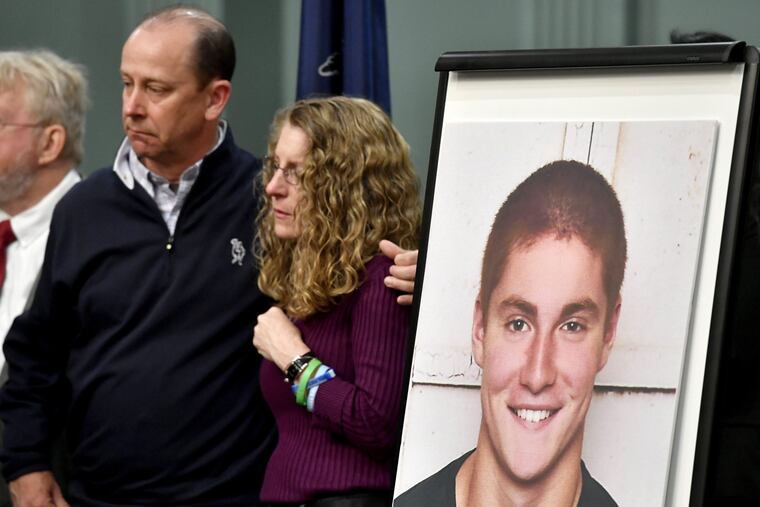Pa. on cusp of enacting one of nation’s toughest anti-hazing laws
The bill, which was approved by the state House of Representatives on Tuesday and now heads to Gov. Wolf for his signature, would toughen penalties for hazing.

HARRISBURG — Pennsylvania soon will have one of the strictest anti-hazing laws in the nation.
Gov. Wolf said he will sign a bill that would toughen penalties for hazing and force any fraternity or other organization that promotes or condones it to pay steep fines and even forfeit property.
The legislation, which was unanimously approved by the Senate on Monday, is named after Timothy Piazza, the New Jersey native and Pennsylvania State University student who died in 2017 following a fraternity pledge party that involved a gauntlet of binge-drinking games.
"We must give law enforcement the tools to hold people accountable and ensure schools have safeguards to protect students and curb hazing," Wolf said in a statement.
The legislation would create a new, felony-level offense of aggravated hazing, punishable by up to seven years in prison. It would also, for the first time, permit confiscation of frat houses where hazing occurs.
"This bill is one of the most significant reforms in the country," said Pennsylvania Senate Majority Leader Jake Corman (R., Centre), who sponsored and championed the bill.
He added: "The Piazza family has shown great courage. … They have made changing the law in Pennsylvania — and nationally — their movement to ensure that Tim's death has not been in vain."
The legislation passed the House last week.
The bill defines hazing as forcing students or minors to consume food, alcohol or drugs that could lead to emotional or physical harm, or having them endure brutality such as "whipping, beating, branding, calisthenics or exposure to the elements."
Cases resulting in bodily injury or death would be defined as aggravated hazing, a third-degree felony. Under current Pennsylvania law, hazing is a summary offense. The law will establish degrees of hazing, with varying punishments that give prosecutors discretion.
Any organization that "intentionally, knowingly or recklessly" promotes or enables severe hazing could be forced by a judge to forfeit the property on which the crime occurred, according to the bill. Fraternities and sororities would also be exposed to possible felony charges, whereas schools could be subject to institutional hazing, an offense punishable by fines up to $15,000.
The legislation also contains a so-called safe harbor provision to provide immunity to students who call police, campus security, or emergency personnel to report that someone needs medical attention, as long as they stay with that person until help arrives.
Piazza was a 19-year-old sophomore engineering major from Lebanon, N.J., when he died in February 2017. He suffered a traumatic brain injury after a series of falls — including down a set of stairs — following a night of heavy drinking at a pledging party at the Beta Theta Pi fraternity. Fraternity members did not call for medical help until the next morning.
Afterward, his parents, Jim and Evelyn Piazza, became anti-hazing advocates.
Last month, the Piazzas and three other couples who also lost children in fraternity hazings met with the National Panhellenic Conference of 26 national sororities to work together to find strategies for dealing with the problem. The group said it would push for legislation in every state that includes tougher penalties for hazing, and would launch a campaign to educate college students as well as middle and high school students about the dangers hazing presents.
"We decided it's better to work with them to make it better," Jim Piazza said at the time.
Twenty-six people have faced criminal charges stemming from the case, according to the state Attorney General's Office, which is handling the prosecution.